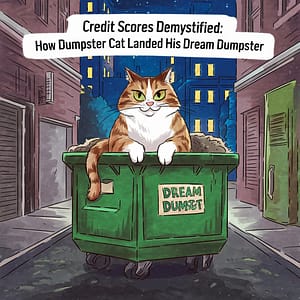 If you’ve ever wondered how Dumpster Cat secured his luxurious dream dumpster in the best alley in town, here’s a secret—it wasn’t luck, it was a solid credit score. But what exactly is a credit score, and why is it crucial to your financial health? Dumpster Cat is here to demystify this puzzling number with simplicity, humor, and practical advice. Buckle up and let’s dive deep!
If you’ve ever wondered how Dumpster Cat secured his luxurious dream dumpster in the best alley in town, here’s a secret—it wasn’t luck, it was a solid credit score. But what exactly is a credit score, and why is it crucial to your financial health? Dumpster Cat is here to demystify this puzzling number with simplicity, humor, and practical advice. Buckle up and let’s dive deep!
What Exactly is a Credit Score?
Think of your credit score as your financial reputation. Just like cats in the alley earn a reputation based on their reliability—like showing up on time for tuna treats or returning borrowed toys—a credit score tells lenders how trustworthy you are with money. It’s essentially your money manners boiled down into a three-digit number.
Why Your Credit Score Matters
Your credit score affects many areas of your life:
- Getting Loans and Credit Cards: Want to buy that dream dumpster or get a shiny new toy? A good credit score helps you secure loans and favorable interest rates.
- Renting a Home: Landlords often check your credit score to see if you’re likely to pay rent on time.
- Utility Companies: Even basic services like electricity, water, or internet might require a good score or ask for higher deposits if your score is low.
- Employment: Some employers even glance at credit scores as part of their background checks.
How Credit Scores are Calculated
Five key factors shape your credit score. Dumpster Cat breaks it down:
1. Payment History (35%)
This is simple: Do you pay your bills on time? Late payments or missed payments ding your score significantly.
Dumpster Cat Tip: Always pay at least the minimum on your credit cards and loans. Set reminders if you’re forgetful!
2. Amounts Owed (30%)
This is how much you owe compared to your available credit, also known as your credit utilization ratio. If your total credit limit is $10,000 and you’ve used $3,000, your credit utilization is 30%.
Dumpster Cat Tip: Keep this ratio below 30% to maintain or boost your score.
3. Length of Credit History (15%)
The longer your credit history, the better lenders can judge your financial responsibility. Older accounts positively impact your credit score.
Dumpster Cat Tip: Keep your oldest accounts open and active, even if you don’t use them frequently.
4. New Credit (10%)
Opening multiple accounts in a short span can hurt your score. Lenders might see you as risky or desperate.
Dumpster Cat Tip: Only open new credit accounts when truly necessary.
5. Types of Credit (10%)
Having a mix of credit types—like credit cards, mortgage, and car loans—can boost your score because it shows lenders you’re good at managing different financial responsibilities.
Dumpster Cat Tip: Diversify carefully and responsibly, never just for the sake of diversification.
What is Considered a Good Credit Score?
Here’s the Dumpster Cat simplified scoring scale:
- Exceptional (800-850): You’re financial royalty; lenders trust you implicitly.
- Very Good (740-799): You’re reliable and responsible; you’ll get attractive rates.
- Good (670-739): Solid reputation; you’re doing well.
- Fair (580-669): You’re seen as risky; improving your habits can quickly raise your score.
- Poor (300-579): You’ve hit financial trouble; it’s critical to focus on improving your financial habits now.
Dumpster Cat’s Actionable Tips to Improve Your Credit Score
Check Your Credit Report Regularly
Mistakes happen, even in alley life. Check your credit report annually at AnnualCreditReport.com to ensure there are no errors dragging your score down.
Always Pay on Time
Set automatic payments if you’re prone to forgetting due dates. Even one late payment can seriously harm your score.
Pay Down Debt Strategically
Reduce your credit card balances and aim to get utilization below 30%. Start with the highest interest cards or those closest to their limit.
Limit New Credit Applications
Apply sparingly, only when absolutely needed. Each application temporarily reduces your credit score.
Keep Older Accounts Open
Don’t close older credit cards, even if unused, because their age contributes positively to your score.
Negotiate with Lenders
If you miss a payment or fall into trouble, speak directly with your lenders. Often, they’ll work out a repayment plan or remove a late payment from your report as a courtesy.
Common Credit Score Myths Dumpster Cat Wants to Bust
- Myth 1: Checking Your Own Credit Lowers Your Score
Checking your credit report or score yourself (a soft inquiry) doesn’t impact your score. - Myth 2: You Only Have One Credit Score
You have multiple scores, though the FICO score is the most widely used by lenders. - Myth 3: Higher Income Equals Higher Credit Score
Your income doesn’t directly influence your credit score. It’s how you manage your money, not how much you make, that matters.
Dumpster Cat’s Real-Life Story: How I Improved My Score
Dumpster Cat once struggled with late payments (too many naps!) and maxed-out credit cards (too much tuna!). After deciding to change habits, Dumpster Cat started paying bills on time, reduced credit balances, and limited new credit applications. Within six months, he saw significant improvements, eventually landing his dream dumpster with favorable terms.
Why Patience is Crucial
Improving your credit score doesn’t happen overnight. It requires patience, consistency, and good financial habits. Stay disciplined, and over time you’ll see meaningful improvements.
Final Thoughts from Dumpster Cat
Your credit score isn’t just a number; it’s your financial passport to better opportunities and security. Understand it, monitor it, and nurture it, and you’ll soon see the doors to your financial dreams open wide.